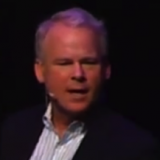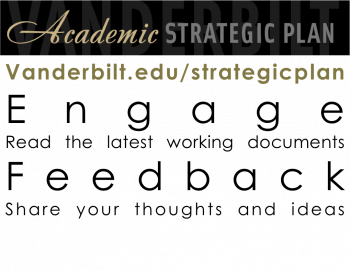The Discovery ROI
Dear faculty and staff colleagues,
During my end of the academic-year-end conversations with faculty and staff, there was great interest in hearing more about the plans for university investments in research. As reflected in the Academic Strategic Plan, Vanderbilt and the Provost’s Office have a broad and inclusive vision of research. Although I am a cell biologist, my view of research extends far beyond those in white coats working in a laboratory. When I speak of our research, it encompasses those developing different modes of creative expression to connect with the human spirit; those analyzing scholarly works and society to chart the past, present and future of humanity; and those testing hypotheses, gathering data, and designing and building models to expand human knowledge and abilities. How Vanderbilt supports and innovates to promote research across and within all disciplines is of utmost importance.
In February of this year, I was an invited speaker at an American Academy of Arts and Sciences-sponsored panel discussion at Duke on the stability of the biomedical research enterprise. The topic of steadily declining federal research funding was front and center. One panelist noted that while we often think of it as a given, federal research funding was non-existent prior to World War II. It jumped $5 million in 1940 to $405 million in 1960, nearly 40-fold with CPI inflation considered. In 2015, we are now faced with the stark reality that extramural sources of research funding may decline in terms of real dollar value as quickly as they once skyrocketed.
The changing landscape for research funding is a topic of great discussion in departments, schools, and colleges across the university, and not just in the sciences and engineering. The COMPETES Act, a bill that passed in the U.S. House of Representatives this month, proposes substantial cuts to National Science Foundation funding to the geosciences and to social, behavioral and economic sciences.
What does this mean for the future of research at Vanderbilt? I would argue that there is much to be positive about and that, in fact, these are exciting times.
First, Vanderbilt faculty are extraordinarily competitive even in this tighter funding landscape, with new award announcements and national recognitions pouring in weekly.
Second, strategic institutional investments in research are essential. The Chancellor and I understand the importance of promoting research and scholarship across all disciplines. We continue to commit substantial resources to supporting innovative projects through Discovery Grants, Research Scholar Grants, International Research Grants and now the Trans-Institutional Program awards. Our holistic, trans-institutional approaches to research expand our capacity for discovery and increase the chances our results will have strong societal impact. Philanthropic organizations are much more likely to support such research, which offers additional ways to sustain our discoveries.
Third, we must be creative in advocating for the importance of research. No matter the area of interest, we need to communicate effectively its importance. It is critical, therefore, to engage the public and to explain why our work advances society.
Finally, our investments in research must be broad-based. Surprising discoveries often result as unanticipated consequences of our research endeavors and collaborations. Whether it’s a digital humanities project on the history of slavery that contributes to the national dialogue on race, or inter-disciplinary research that tackles the behavioral, societal and biomedical underpinnings of the growing obesity problem, the returns on the investments in discovery are infinite.
Summer is now upon us. The Open Dore newsletter will return to launch the next academic year. Meanwhile, I look forward to hearing stories of your summer discoveries.
Sincerely,

Susan Wente
Showcasing Faculty Research to the Board of Trust
Over the past year we’ve showcased the research and scholarship of numerous faculty members to the Board of Trust. The goal was to 1) demonstrate how faculty from across campus are addressing the most pressing challenges facing society today; and 2) how the trans-institutional approach can propel Vanderbilt forward as a leader in research and discovery.
The Board of Trust engaged with the faculty during breakout sessions that featured TED-style talks which brought to life the cutting-edge explorations that are taking place all across campus. The trustees were also able to hear from undergraduate, graduate and professional students about their experiences working with faculty and on their own related projects.
In November, we explored the many intersections of the study of neuroscience with other disciplines including education, law, music and disease discovery. In one session, for example, Peabody Dean Camilla Benbow (pictured left) led the group in a discussion about how discoveries in neuroscience are improving educational practice and outcomes. discovery. In one session, for example, Peabody Dean Camilla Benbow (pictured left) led the group in a discussion about how discoveries in neuroscience are improving educational practice and outcomes.
In February we tackled several “grand challenge”

problems like obesity, quality of life in aging, energy and the future, and security and privacy in the era of big data. In one session, Mike Vandenberg (pictured right) shared his innovative approach to changing how we consume energy.

| ![Provost - Open Dore E-Newsletter [Vanderbilt University]](https://cdn.vanderbilt.edu/vu-URL/wp-content/uploads/sites/119/2019/01/19145739/open-dore-email-header.jpg)